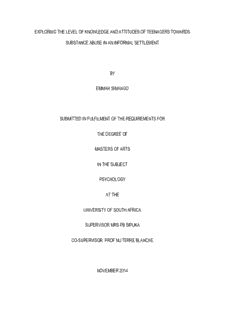Table Of ContentEXPLORING THE LEVEL OF KNOWLEDGE AND ATTITUDES OF TEENAGERS TOWARDS
SUBSTANCE ABUSE IN AN INFORMAL SETTLEMENT
BY
EMMAH SIMANGO
SUBMITTED IN FULFILMENT OF THE REQUIREMENTS FOR
THE DEGREE OF
MASTERS OF ARTS
IN THE SUBJECT
PSYCHOLOGY
AT THE
UNIVERSITY OF SOUTH AFRICA
SUPERVISOR MRS PB SIPUKA
CO-SUPERVISOR PROF MJ TERRE BLANCHE
NOVEMBER 2014
DECLARATION
I declare that “Exploring the level of knowledge and attitudes of teenagers towards
substance abuse in an informal settlement” is my own work and that all sources that I
have used or quoted have been indicated and acknowledged by means of complete
references.
………………………………………. ……………………
Signature (Emmah Simango) Date
i
ABSTRACT
Substance abuse is a pervasive problem across the world. The most commonly abused substanc-
es include tobacco, alcohol and dagga. In teenagers, research has found out that substance abuse
is often linked to multiple factors such as scholastic problems, mental and health problems, risky
sexual behaviour, accidents, crime and violence. The present study aimed to explore the level of
knowledge and attitudes of teenagers towards substance abuse in an informal settlement. The
target population were teenage girls and boys between the ages of 13 and 19. A mixed method
approach was employed in this study. A self-administered questionnaire was designed and used
to collect data. This questionnaire contained both closed and open ended questions. The Statis-
tical Package for Social Sciences (SPSS) was used to analyse the data. Findings show that teen-
agers have adequate knowledge and appropriate attitudes towards substance abuse. However,
the results also indicate that the provision of information on substance abuse remains important
in shaping attitudes of young people. Interventions such as awareness campaigns, focus group
discussions, education and developmental programmes that contribute to knowledge on the im-
pact of and ways to control substance abuse are recommended.
KEY TERMS
Abuse; attitudes; drugs; informal settlement; knowledge; substance/ drug abuse; teenagers
ii
DEDICATION
I dedicate this work to my children (Blessing and Shalom) who always support and give me
strength in completing my studies; my late mother who saw the value of education to be
successful. To my father who always believes in me.
iii
ACKNOWLEDGEMENTS
I would like to express my sincere appreciation and gratitude to the following for making this
dissertation possible:
The Lord, My God for His guidance and strength in pursuing and completing this
research successfully.
Very special thanks to Ms Precious B. Sipuka (Supervisor) and Professor Martin J.
Terre Blanche (Co-Supervisor) for their valuable support, guidance and patience
throughout this work. They worked diligently and tirelessly with me in this research
study. I really appreciate their help.
I would like to thank Ms S. Muchengetwa who worked very hard in helping me in
analysing and interpretation of the data.
Thank you all who volunteered and participated by providing information through the
questionnaire. Many thanks to the Plasticview informal settlement leaders and
Tinyiko Ndlovu for his continuous assistance during library research.
My sincere gratitude to my husband, Victor and my children Blessing T. and Shalom
T Simango for their support and inspiration throughout the study. My father, Mr L.R.
Chifuro thank you for your encouragement.
I am also grateful to Mr Jack Chokwe for the editing and the University of South
Africa for financial assistance.
iv
Finally, I thank all those who contributed in significant ways to the success of this
work, whose names I may not mention. May God bless you all.
v
LIST OF FIGURES
Figure 4.1 Histogram showing the variation of respondents by age 63
Figure 4.2 Bar chart showing the perception on the level of knowledge on substance
abuse 68
vi
LIST OF TABLES
Page
Table 4.1 Ages 63
Table 4.2 Educational qualification 64
Table 4.3 Understanding of what the term substance abuse means 65
Table 4.4 Perception on the level of knowledge of substance abuse 67
Table 4.5 Teenagers’’ opinions on the knowledge about the reasons for abuse 69
Table 4.6 Teenagers’ attitudes towards substance abuse 70
Table 4.7 Indicators of change of behaviour when taking drugs 74
Table 4.8 Ways teenagers access information on substance abuse 75
Table 4.9 Factors that influence in contributing to substance abuse in the community 77
Table 4.10 Problems resulting from substance abuse 79
Table 4.11 Health effects resulting from substance abuse 80
Table 4.12 Social effects resulting from substance abuse 81
Table 4.13 Economic factors resulting from substance abuse 82
Table 4.14 Psychological effects resulting from substance abuse 83
Table 4.15 Peer pressure contributing factors to substance abuse 84
vii
Table 4.16 Level of availability of drug 85
Table 4.17 Level of teenagers’ consumption of drug 87
Table 4.18 Most dangerous drugs 90
Table 4.19 Problems community are perceived to be experiencing due to drug abuse 91
Table 4.20 Problems community authorities encounter dealing with drug abuse 92
Table 4.21 Reasons why substance abuse is out of control in the community 94
Table 4.22 Reasons why programmes are not available 95
Table 4.23 Reasons why respondents are not aware of such organizations 97
Table 4.24 Ways to curb substance abuse 99
Table 4.25 Thoughts and feelings about teenagers’ substance abuse 100
Table 4.26 Recommendations on knowledge and attitudes of substance abuse 102
viii
ACRONYMS
AIDS Acquired Immunodeficiency Syndrome
ARVs Anti-retroviral drugs
CDA Central Drug Authority
GDP Gross Domestic Product
HIV Human Immune Virus
NDA National Drug Advisory
NIAAA National Institute on Alcohol Abuse and Alcoholism
NIDA National Institute on Drug Abuse
PSUD Psychoactive Substance Use Disorder
SANAB South African Narcotics Bureau
SANCADS South African National Council on Alcoholism and Drug Studies
SAPS South African Police Services
STDs Sexually Transmitted Diseases
UN United Nations
UNDP United Nations Development Programme
UNDCP United Nations International Drug Control Program
ix
Description:is often linked to multiple factors such as scholastic problems, mental and health problems, risky sexual behaviour, accidents recommended. KEY TERMS. Abuse; attitudes; drugs; informal settlement; knowledge; substance/ drug abuse; teenagers A workbook, University of. Johannesburg, 33(1)

